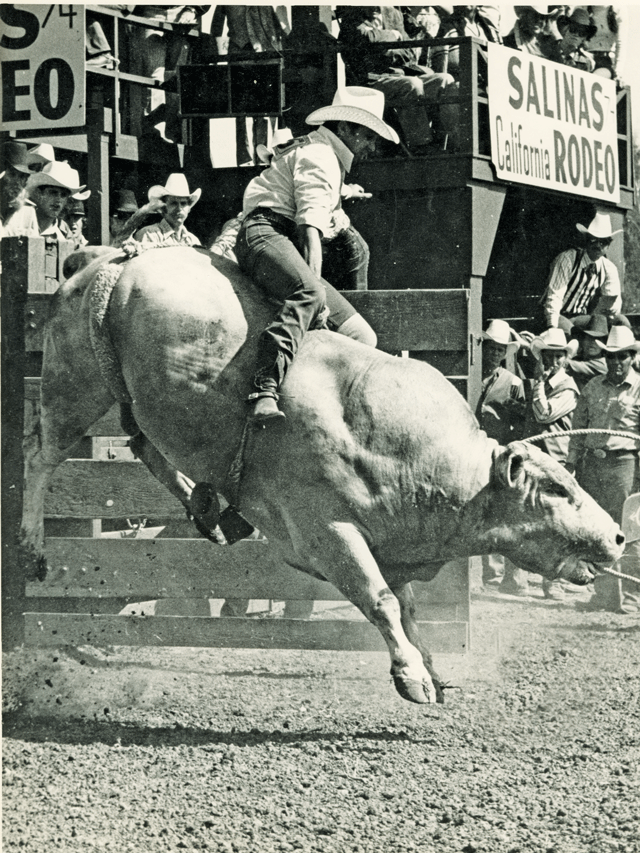Lee and Dixie Wheaton have five PRCA gold cards within their family. Lee, a former multiple-event contestant, and his wife Dixie, a barrel racer, each have one. Their daughter Deena Wheaton, has hers, and Dixie’s dad, 1939 world champion steer roper Dick Truitt, had his gold card. Lee and Dixie’s niece, Trula Truitt Churchill, also has hers.
Lee began life in Rochester, New York, the son of Mel and Dee Wheaton. His dad owned a dude ranch, with weekend and overnight guests, and part of Lee and his older brother Jim’s job was to take care of the up to 100 head of horses that were kept. Each year, Mel would send for a new load of horses from the west, and Lee and Jim’s job would be to make dude horses out of them. “Some of the horses that came to us were not gentle enough for eastern dudes,” Lee remembered.
When Jim started rodeoing, Lee wasn’t far behind. Lee began riding bulls in 1947, when he was twelve years old. His dad had produced rodeos for a few years, at which Lee sometimes served as the bullfighter, and his parents were supportive. At the time, New York State had lots of open and amateur rodeos. Lee competed at rodeos put on by Pappy Westcott and his son Jackie, and the Baldwin family, among others.
Dixie Truitt was born in 1940, in Ada, Oklahoma, the daughter of Dick and Juanita Truitt. She traveled with her daddy as he rodeoed, and when she was twelve, she began barrel racing. In 1956, she got her Women’s Pro Rodeo Association card when it was the Girls Rodeo Association, and in 1959, she qualified for the first National Finals Rodeo, but her daddy wouldn’t let her compete because it was during college finals tests.
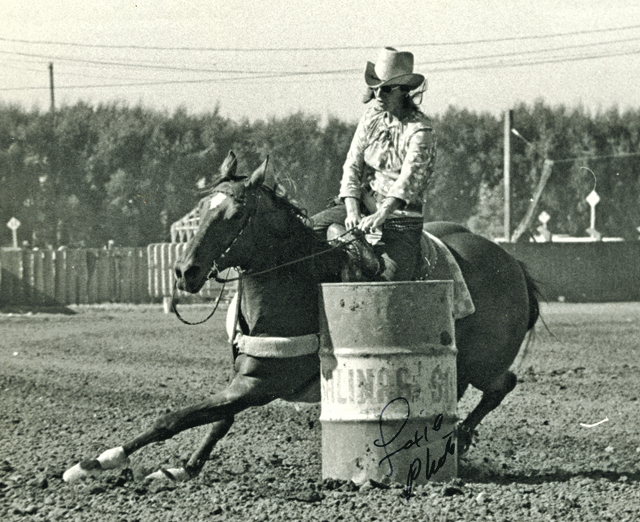
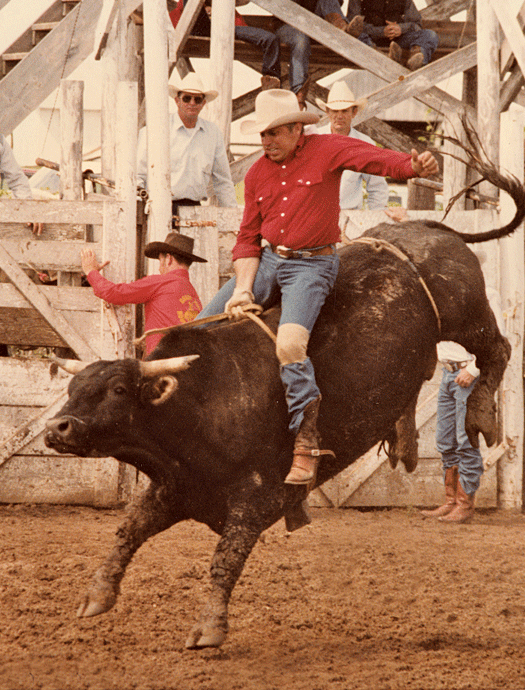
Lee graduated from high school in 1954 and amateur rodeoed up and down the East Coast. Two years later, he joined the Rodeo Cowboys Association, and went farther, traveling to the south and crossing the Mississippi River, going to rodeos in Missouri.
He was doing all three roughstock events and even steer wrestling, occasionally. In 1956 and 57, he worked for Frontier Town, a tourist attraction in New York. Frontier Town held three mini-rodeos a day, featuring one bareback ride, one saddle bronc ride, one calf roping run, one steer wrestling run, and one bull ride, plus contract acts. Lee was the roughstock cowboy and even steer wrestled a time or two. On Saturday nights, he’d drive the sixty miles to the pro rodeo in Lake Luzerne. “We’d drive like hell to get there, and contest there,” he said. He won the saddle bronc riding and the bull riding at Lake Luzerne’s series one year. He and his buddies would also take off for Cowtown, New Jersey, and compete there.
Once he expanded his territory because of his pro card, he went to Florida one January, but with no success. “I rode every bull I got on, and never won a penny,” he remembered. It was before public announcement systems and riders didn’t know their scores till they looked at judges’ sheets after the rodeo. In Okeechobee that year, he rode a bull they had placed on regularly. “Everybody patted me on the back and said, ‘that ride looked great.’” But he didn’t win anything. Afterwards, he went to the judge, Buddy Medford, and asked why he didn’t place. “Buddy said, ‘that bull jumped and kicked but he didn’t spin.’”
The next week in Kissimmee, Lee covered another bull with a good ride. “I had a bull that spun, wound it up, and again, everybody was saying, ‘that was a good ride.’” When the rodeo was over, Lee hadn’t won a dime. Medford was judging again, and Lee asked what the problem was. Medford replied, “Lee, he spun real good but he didn’t jump real good.’” They held it against him, that he was a Yankee and was a newcomer to the South.
Every October, when rodeos had slowed down, he headed back to New York. Depending on how he had done, he either got a job or hunted all winter. Then, in January, he’d head back to Florida and start all over again.
Lee met Dixie at a rodeo in Cookeville, Tennessee in June of 1961. They married in Iowa two and a half months later. They had planned to rodeo in place of a honeymoon, but Lee had torn up the palm of his hand and it wasn’t healed, so they took off. “We honeymooned in 21 states and five provinces,” Lee said, visiting Niagara Falls and other sites. The first bull he got on after marriage was one he’d won on a few times. For that ride, “I fell off like a big toad,” he said. “My buddies came around and said, “Damn, Lee, married life doesn’t agree with you, does it?” he laughed.
That fall, Dixie, who had graduated from East Central College in Ada, Okla., had a contract to teach physical education in Wichita, Kan. So they got an apartment in Wichita, got Dixie settled in, and Lee hit the rodeo trail again.
They stayed in Wichita for a year before going to Scott City, Kan., where Dixie spent four years teaching physical education: archery, swimming, bowling, basketball, tennis, and more. They moved again, this time to Dixie’s home state. “That Oklahoma girl got homesick,” Lee said. She had been working on her master’s degree and got a teaching job in Tulsa. It was 1965, and they moved to the place where they still reside, near Mounds, Okla., just south of Tulsa.
Dixie taught school in Tulsa from 1965 to 1992, teaching P.E. and coaching basketball. She was awarded the girls basketball coach of the year honors in the First Frontier Conference, and finished her teaching career at Will Rogers High School in Tulsa. She switched to the classroom, teaching child development, parenting, and psychology.
While at Will Rogers High School, the school had an annual roping contest among staff. Dixie won it several times, having grown up with her dad, the world champion steer roper, her uncle Everett Shaw, a six-time RCA steer roping champion, and her maternal granddad, Cole Underhill, a steer roper before the formation of the RCA.
Lee and Dixie rodeoed through the summers and during the school year, when she came home from school each night, Lee would have her horses saddled and ready to go. They usually bought race horses and Dixie trained them for the barrels. During her years, she had four bays that she considered her best. Levan II, “Reverend,” she considered her fastest horse ever. On Reverend, she won three rounds in Salinas, Calif. one year.
Cajun was another horse that was one of her best, as was Tiny Mark, a gelding from Arkansas, and Strongwall Snip. Dixie was a good trainer, coming by it “honest,” she said. Her daddy trained his own horses, and if a horse didn’t make it as a steer roping horse, Dixie would get him.
Their daughter Deena was born in 1962, and when she was sixteen, she had her WPRA card. Clem McSpadden called Deena “the teenage sensation from Mounds, Okla.,” and she ran barrels along with her mother.
Several times, while he was injured, Lee was called on to judge. In 1965, with a broken arm, he judged rodeos in Ft. Worth, Miami, Fla., and Chicago. He also judged the College National Finals Rodeo three times.
In 1975, Lee quit riding bulls. He’d been an RCA card holder for 21 years, and he still loved the sport, but it was time to quit. Dixie and Deena were still running barrels, but Lee couldn’t go with them. “I wouldn’t hardly go to a pro rodeo with them,” he said. “I knew, if I went, I’d want to get on. I was 41 and that was old enough to quit.”
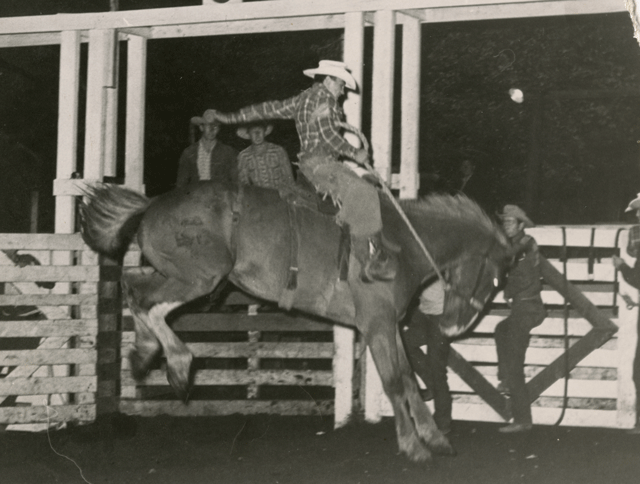
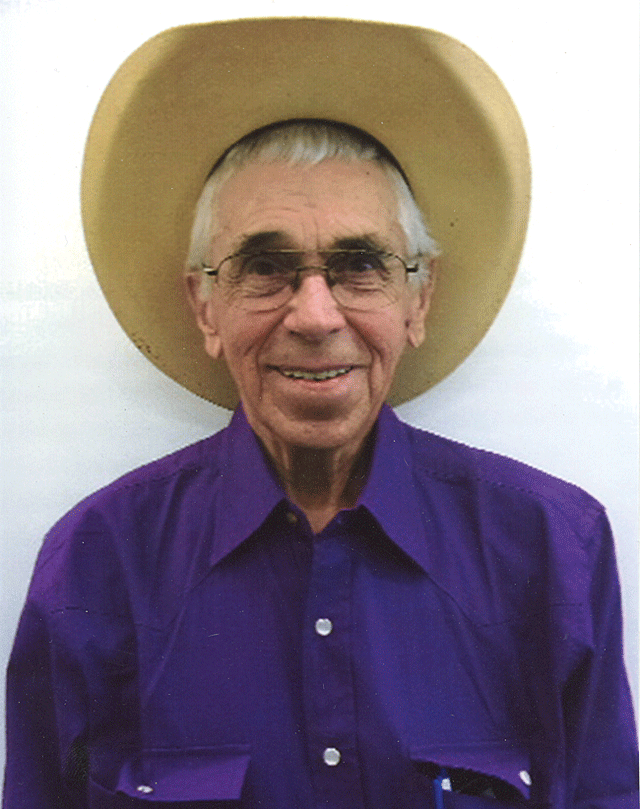
In 1980, when Dixie turned forty, her good friend Florence Youree entered her in a senior pro rodeo in Canadian, Texas. Lee went with her, and he saw that the senior bull riders were all guys he had rodeoed with for twenty years. He watched the rodeo and said, “If those guys can still ride bulls, I can too.” The senior pros were fun for them. Rodeoing “wasn’t stressful,” Lee said. “When you left home, you had money in your pocket, and you knew you could pay your bills. You didn’t have to win anything.” The two of them qualified for the National Senior Pro Rodeo Finals each year from 1980 to 1985.
In 1982, Dixie won the year-end barrel racing title for the Senior Pros. That year, at every senior rodeo she ran, she won first place. She rode Dial Doc, a sorrel gelding that she and Lee traded for one of their horses and a tractor and brush hog. Doc, Lee said, was “half lunatic,” a horse who had been soured going into the arena. But Dixie figured out a way to get him down an alley. Two great big Native Americans who were at the senior pro rodeos would get ahold of the cantle and walk him up to the gate. “As soon as he got through the gate, he’d do his job great,” Lee remembered.
Towards the end of his bull riding career in the RCA, Lee took a job with the Oklahoma Department of Agriculture. He worked for them for twenty years, testing for brucellosis and later visiting horse events checking for health papers.
Dixie continued to train horses and ran barrels up to just a few years ago. Between she and Deena, they have trained eight world champion breed horses.
Dixie had a stroke a few years ago but she and Lee still live in their home of 54 years. They celebrated 57 years of marriage in 2018.
They also enjoy Deena’s son, Jesse Chelf, who is in the U.S. Army. Jesse has been stationed at Fairbanks, Alaska and has served tours in Afghanistan, Vietnam, the Philippines and Germany. Lee and Dixie have two great-granddaughters.
Rodeo days were good days, and Lee loved riding bulls. “It was the biggest adrenaline rush I could imagine,” he said. “I still look at bull riding pictures and my heart gets to beating fast, thinking about how good it felt. I loved it.”
They’ve had a good life. “We feel really fortunate. We’ve both never had a job that we didn’t enjoy. It’s been a wild ride.”








